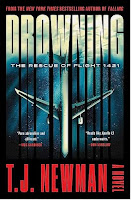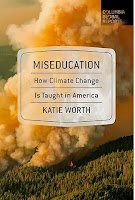Tuesday, June 17, 2025
Human Nature by Kate Marvel
Tuesday, January 7, 2025
Sleep Drink Breathe by Michael Breus
SLEEP DRINK BREATHE by Michael Breus is subtitled “Simple Daily Habits for Profound Long-Term Health” and focuses on the basics. Breus is a double-boarded clinical psychologist and clinical sleep specialist who stresses that “doing something adequately, or at the bare minimum, is not the same as doing it well and getting more out of your effort.” He begins with a discussion of what he calls the first domino and his primary area of expertise, sleep. In that and subsequent sections he provides simple facts, offers assessment tools (e.g., sleep diary), reviews troubleshooting options (e.g., maintain a consistent sleep schedule), and provides scientifically based best practices. Breus frequently summarizes helpful Takeaways and then outlines a three-week Sleep-Drink-Breathe Plan. That plan involves five “check-ins” with accompanying activities throughout the day and commitment might be higher if readers encourage a friend to join them. Although some chapters of SLEEP DRINK BREATHE are stronger than others, the tone throughout is conversational and generally uplifting. As readers review this text, they may also be interested in a recent New York Times article (quoting Breus and other experts) about relatively easy health tips.
Thursday, June 20, 2024
The Nature of Our Cities by Nadina Galle
Thursday, March 21, 2024
On the Move by Abrahm Lustgarten
ON THE MOVE by Abrahm Lustgarten is subtitled “The
Overheating Earth and the Uprooting of America.” Lustgarten, an investigative
journalist for ProPublica, points to several main factors that have already
begun to impact movement in the USA: wildfires; flooding (especially in coastal
regions); extreme heat or humidity; and droughts. He vividly cites research
such as: “Scientists estimate that as many as one in three people on the planet
will find the places they live unmanageably hot or dry by 2070.” In the USA
alone, he notes that five million climate migrants “could translate to a shift
of fifty million additional people by the end of the century.” His perspective –
that our lack of preparation for climate change will intensify differences
between rich and poor – is supported by his extensive and disturbing research.
For example, he notes that “a
study published in 2021 in the journal Cities examining the resilience policies of the
101 largest U.S. cities found that 31 of them had no policies whatsoever, and
that only 33 had conducted any sort of evaluation of their climate
vulnerability.” Lustgarten argues that even when change is attempted (as described
in Atlanta or New Orleans), it often results in waves of gentrification,
further separating communities. He goes so far as to say that “Climate change,
however, is about to make the differences between winners and losers so extreme
that they will threaten the underpinnings of the American economy and security.”
Is it any wonder that we see declines in the happiness scale, especially
for younger Americans? Lustgarten
attempts to balance this by including a more uplifting section involving a
discussion with an urban planner in Detroit who “recognizes that people are
often prejudiced against refugees…. [and asks] what's a narrative that might
galvanize people to see opportunity in welcoming outsiders?” Much to consider
and to investigate further; ON THE MOVE contains multiple pages of notes and bibliographic references, plus an
index. Other recent
texts on this high interest topic of climate migration include Jack Bittle’s The Great
Displacement and Nomad Century by Gaia Vince.
Monday, November 6, 2023
Young Readers: The Sixth Extinction and The Uninhabitable Earth
THE UNINHABITABLE EARTH by David Wallace-Wells is now available in an adaptation for Young Adults. It tells the story of “Life After Warming” and shares dire predictions regarding a range of topics including dying oceans, greenhouse gas, extreme weather events, and results like hunger and migration. However, the language is quite stilted (e.g., “like our sea-level myopia, it threatens to occlude our picture of what global warming means for us”) and there is even an entire section improbably named The Anthropic Principle (how many high school students can readily explain that idea?). Plus, graphics or images are totally missing. And, despite an array of statistics included in the text, there are no sources listed and no bibliography for further reading. Those additions and a much more conversational tone would have made this text more appealing and more inspirational for its intended young adult audience. Kirkus sums it up well: “Heavy going, both in content and prose style, but filled with critical content.”
Fortunately, there are a variety of accessible texts on climate change and the environment geared to high school students.
Friday, September 15, 2023
Mother-Daughter Murder Night by Nina Simon
Saturday, July 1, 2023
Drowning by T. J. Newman
Wednesday, June 14, 2023
The Last Lifeboat by Hazel Gaynor
I read the entire novel in less than 24 hours and am still curious
to learn more about the actual tragedy that occurred when (like the fictional SS
Carlisle in the story) a passenger ship (SS City of Benares) was torpedoed
in the Atlantic and a stray lifeboat drifted for several days with dimming
hopes of rescue. The Merseyside Maritime Museum and the Imperial War Museum have made some relevant photos and documents available
online. Gaynor weaves much of this into her writing and does an excellent job
of conveying the time at sea. In addition, she probes the feelings of mothers
who stayed behind and the “different experience for men responding to the call
to do their bit.” A historical note with more details, suggested discussion questions,
and Gaynor’s book suggestions accompany this fascinating text. THE
LAST LIFEBOAT is highly recommended, especially for
readers who have enjoyed other WWII survival adventures like Ruth Sepetys’ Salt to the Sea or works by Elizabeth
Wein (Code Name Verity; Rose Under Fire).
Monday, February 20, 2023
The Great Displacement by Jack Bittle
Sunday, February 19, 2023
The Climate Book by Greta Thunberg
THE CLIMATE BOOK by Greta Thunberg is sure to draw attention just as its young compiler often does. Subtitled “The Facts and the Solutions,” Thunberg has gathered essays from an remarkable array of experts including Elizabeth Kolbert (The Sixth Extinction), Naomi Oreskes (The Big Myth), Bill McKibben (Falter), and a range of international climate scientists, activists, and professors. The topics covered are varied, too, with chapters on How Climate Works, How Our Planet is Changing, and How it Affects Us. Some of the questions which are addressed include: What happens at 1.5, 2 and 4 degrees C of warming? Or Is the Future Electric? There are also sections on Wildfires, Dangerous Weather, The Amazon, Antibiotic Resistance, and The Challenge of Transport, to name just a very few. Chapter 4 includes over two dozen selections which highlight What We’ve Done About It while Chapter 5 details roughly twenty ideas on What We Must Do Now (like Changing Our Diets, Rewilding, and Decarbonization). Thunberg writes (and is quoted in a review from NPR): "No entity other than the media has the opportunity to create the necessary transformation of our global society." She is an effective, relatable spokesperson, especially when combining her voice with a 100 others in THE CLIMATE BOOK. The endnotes were so extensive that they are available online and the text is filled with graphs and diagrams. THE CLIMATE BOOK received starred reviews from Booklist (“a definitive book on climate change now”) and Kirkus (“Vital reading”).
Published by Columbia Global Reports, MISEDUCATION by Katie Worth is subtitled: How Climate Change Is Taught in America. Worth is an Emmy and Edward R. Murrow Award-winning investigative journalist and while her work is sometimes rather academic in tone, she includes numerous engaging anecdotes and raises key questions about curriculum and textbook selection. Highly relevant in this time of increasing debate over instructional content and bans on books in school libraries, Worth includes chapters on topics like Science and Doubt, the Teachers, the Standards, and Selling Kids on Fossil Fuel. MISEDUCATION is extremely well-researched and received a starred review from Publishers Weekly (“Policymakers and educators alike will find much to consider.”). Villanova University included Worth in their year long program on climate change; this video shares some statistics and charts from her work.
Welcome to Continuing the Conversation!
We are in the midst of migrating book reviews to this new blog. To see past reveiws and comments, please visit Book Talk ... A Conversation...
-
I CHEERFULLY REFUSE by Leif Enger has a beautiful, eye-catching cover which reflects the many layers involved in this latest story from an ...
-
GROUNDS FOR MURDER by Betty Ternier Daniels is a debut mystery in the Jeannie Wolfert-Lang series. I am grateful for the free preview copy ...
-
THE ENGLISH MASTERPIECE by Katherine Reay is described by the publisher as “perfect for fans of Kate Quinn and Ariel Lawhon .” Given that ...














